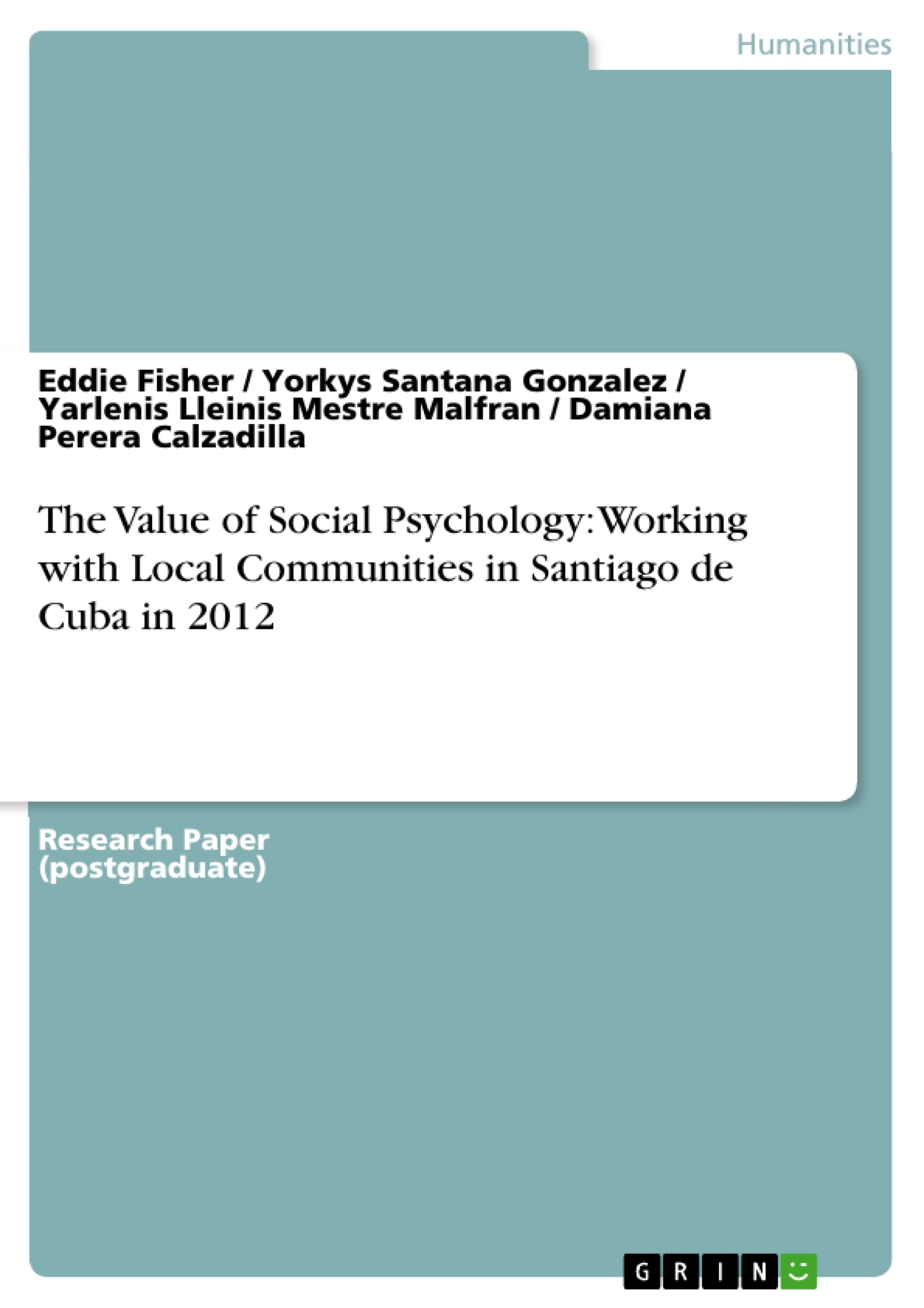It is recognized by academics and the community of practice that social psychology plays an important role in the everyday life of people, both at individual and at local community level. Recent social psychological research expresses the need to develop a better understanding of what good and effective social support for people looks like. This research report presents the outcomes of a field study by students from the Psychology Stream of the Faculty of Social Sciences of the Universidad de Oriente in Santiago de Cuba. A combination of literature review, face to face interviews and focus group meetings was applied to complete the research objectives. A number of specific approaches were identified as being most important to help members of local communities in Santiago de Cuba to resolve some of their social problems. The results suggest that members of local communities in Santiago de Cuba would benefit from adopting these approaches so they become more self-sufficient and self-confident in addressing their social issues. The findings also suggest that the management and control of emotions can play a vital role in enhancing creativity in people to find solutions to their social problems within the communities of this research. The results suggest that similar outcomes could be achieved in other communities within Cuba.
Inhaltsverzeichnis (Table of Contents)
- Introduction
- Introduction
- The Main Research Questions
- Literature Review
- Methodology
- Data Analysis and Representation
- Results and Discussion
- Conclusions
Zielsetzung und Themenschwerpunkte (Objectives and Key Themes)
This research aims to bridge the gap between theoretical knowledge and practical applications of social psychology within local communities in Santiago de Cuba. The study explores how social psychology can be used to improve communication, foster pro-social behavior, and address social issues within these communities.
- The practical application of social psychology in local communities
- The role of attitude, behavior, and competence in social change
- The effectiveness of interventions in strengthening social psychological theories
- The importance of community-based action research and collaboration
- The impact of social psychology on individual and community well-being
Zusammenfassung der Kapitel (Chapter Summaries)
The introduction sets the context of the research, outlining the need to apply social psychology principles in local communities. The main research questions are then presented, focusing on the effectiveness of theory-practice integration, potential interventions, and the development of pro-social behaviors within the communities.
The literature review examines existing research on attitude, behavior, and competence, highlighting the importance of applying these concepts in real-world settings. It also explores the potential of social psychology to address societal problems and the value of using action research methodologies.
The methodology section details the research approach, including the selection of communities, the role of students and academic staff, and the application of a constructivist interpretivist approach within a phenomenological research paradigm. The use of semi-structured interviews and focus group meetings as data collection methods is discussed.
Data analysis and representation focuses on the validity and reliability of the research data, including the triangulation of findings from the literature review, interviews, and focus groups. The researchers highlight the importance of obtaining data from the community of practice to ensure relevance and trustworthiness.
Results and discussion present the findings from the research, emphasizing the positive impact of the students' interventions on community members' attitudes, behaviors, and sense of responsibility. The researchers note the improvement in communication and the increased willingness of community members to engage in pro-social activities.
Schlüsselwörter (Keywords)
This research focuses on the practical application of social psychology, particularly in the context of local communities in Santiago de Cuba. Key themes include attitude, behavior, competence, pro-social behavior, community-based action research, and the role of social psychology in addressing social issues. The study also emphasizes the importance of communication, collaboration, and community empowerment in achieving positive social change.
Frequently Asked Questions
How can social psychology help local communities in Cuba?
Social psychology improves communication, fosters pro-social behavior, and helps community members become more self-sufficient in addressing social problems.
What was the focus of the field study in Santiago de Cuba?
The study examined how integrating theory and practice through action research can strengthen social support and enhance community well-being.
What role do emotions play in solving social issues?
The research suggests that managing and controlling emotions is vital for enhancing creativity and finding effective solutions to community problems.
What research methods were used in the Cuban study?
A combination of literature reviews, face-to-face interviews, and focus group meetings within a constructivist interpretivist framework was applied.
Can these outcomes be replicated in other regions?
Yes, the findings suggest that similar positive outcomes in pro-social behavior and community empowerment could be achieved in other Cuban communities.
- Citar trabajo
- Prof Dr Eddie Fisher (Autor), Yorkys Santana Gonzalez (Autor), Yarlenis Lleinis Mestre Malfran (Autor), Damiana Perera Calzadilla (Autor), 2013, The Value of Social Psychology: Working with Local Communities in Santiago de Cuba in 2012, Múnich, GRIN Verlag, https://www.grin.com/document/215440



